
Exploring the Legal Basis: South West Muslims and the Establishment of Sharia Panels by JNI
The Jama’atu Nasril Islam (JNI), under the leadership of the Sultan of Sokoto, has asserted that Muslims in Nigeria’s South-West region possess the constitutional right to establish Sharia panels. These panels are designed to adjudicate personal and civil matters, such as marriage, inheritance, and family disputes, in accordance with Islamic law. The JNI emphasizes that seeking adjudication under Islamic law is not a privilege but a constitutional right.
The organization references Sections 38 and 275-279 of the 1999 Constitution of Nigeria (as amended), which guarantee religious freedoms and provide for the establishment and operation of Sharia courts for civil matters where applicable.
The JNI clarifies that these panels do not infringe upon the rights of non-Muslims but offer a voluntary alternative dispute resolution mechanism for Muslims who choose to settle personal matters according to Islamic law. They further note that the panels adjudicate only cases where both parties consent, a practice observed in various pluralistic societies worldwide.
The JNI also highlights that Sharia adjudication is not new to the South-West, stating that Yoruba Muslims have historically settled civil disputes through customary Islamic mechanisms, predating colonial rule. They caution that selective opposition to Sharia courts in some parts of Nigeria could alienate the Muslim community and breed unnecessary acrimony. The organization urges state governments in the South-West to respect religious freedoms by allowing willing Muslims access to Sharia panels for civil matters.